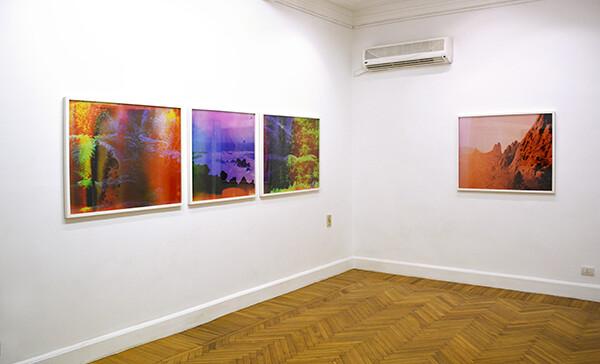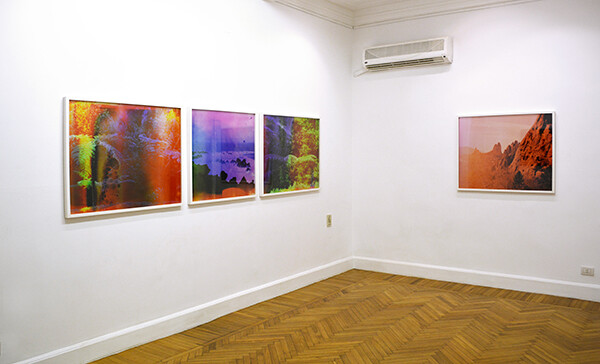Carried by the city’s intense traffic leaving behind the decrepit bronze colossus that is downtown Cairo, a cab ride from battered Tahrir Square to the lusher, more affluent Zamalek neighborhood feels like a prelude to Basim Magdy’s most recent exhibition. Gypsum Gallery is located on the sprawling metropolis’s green lung, Gezira Island, once known as the colonially redolent “Jardin des Plantes”—a name not unlike the discursive relics evoking a deceptively flourishing past that frequently flash up in Magdy’s entrancing films.
Upon entering the gallery, one finds oneself encircled by phantasmagoric photographs the artist took at locations united only in their incongruity. Spanning the trippy rock formations of the American southwest, exhausted by tourist photography; the now volcanically inactive island of Madeira; and close-ups of coral reefs in Sharjah, the manipulated pictures are nearly all washed over by ecstatic acid hazes. Works like A World Within a World Within a World Within an Orange Coral Wall (all photographs 2014), by way of their vertiginous titling alone, are suggestive of the anachronist desire to recoil from modernity’s grip on our nervous system by retreating to actual, far-flung alterity, recuperating transcendental experience or, at least, offering colorful respite. Printed on metallic paper that enhances the images’ commercial-psychedelic veneers, the photographs further speak to the analog apparatuses and modes of perception once so intensely probed by experimental cinema to project a countercultural vision, whose specters these works seem to longingly reanimate in the age of faux-vintage Instagram filters.
A Lifetime Spent Digging for Hibernating Gold sees a small group of white pensioners gathered on a rocky plateau, the sole human presence in this primordial kaleidoscope. Other titles hint at the alien nature of the photographed sites—sought out by temporary foreign visitors to, in turn, absorb their own alienation—in the course of which collective trauma and physics coalesce: The Cautious Passing of Light Through Endless Layers of Forgiveness; And the Sky Outlived All That was too Heavy to Elevate Itself. Magdy’s messianic poetry borders on wry parody, the images’ numinous deep jade and burning orange hues being the result of his artful deployment of household chemicals.
The title of the 2012 film Time Laughs Back at You Like a Sunken Ship, projected in a separate room, meanwhile intimates volatility, and a shot of a large ship on the horizon may reference the Costa Concordia shipwreck of the same year. In it, Magdy performs as a subject entirely engrossed by and committed to artifice and reverie. Dressed in black and shielded by an elaborate head contraption whose Bauhaus-inspired mask-cum-portable painting anterior is backed by mirrors proposing reflection of some kind, this dandy character rambles about a modernist greenhouse in Basel, the artist’s recently adopted base after Cairo. Distinct tropes of Magdy’s film works, such as a sparse, elegiac score, enigmatic ambient sound, and fragmentary, associative editing figure prominently, while architecture provides the film’s many textures: the concrete, if crumbling, kind—an amphitheater in Alexandria, say, or the abandoned speculative high-rise construction sites flanking it—but also the intricate structures of various foliage and flowers.
The film’s exoticizing vision framing these floral transplants constantly shifts its focus across the Mediterranean separating Europe from the distant shores of the land of the Nile, from which these species may originate. Hermetic as it may be, the film thus vaguely conjures the itinerant and transitory concept of civilization while spawning its site-specific tangents that here may range from Basel’s sons—LSD synthesizer Albert Hofmann and nineteenth-century art historian and humanist Jacob Burckhardt, via Nietzsche’s Dionysian nihilism—to, finally, that ancient wonder of the world, the allegedly torched Library of Alexandria.
“The memory of what is not may be better than the amnesia of what is,” reads one of Robert Smithson’s ambiguous oracles penned while mirror-traveling the jungly Yucatan.1 Contemporary Egypt isn’t exactly a non-site and in this light, the exhibition walked a thin line of visual abstraction, alternate temporalities and, well, a somber escapism vis-à-vis the arbitrary public curfews and continued infringements upon freedom of expression enforced by the country’s current regime, upholding one’s ownership of unchecked ocular license as a last resort.
Robert Smithson, “Incidents of Mirror-Travel in the Yucatan” (1969), in Robert Smithson, The Collected Writings, ed. Jack Flam (Berkeley and Los Angeles: University of California Press, 1996), 131.










